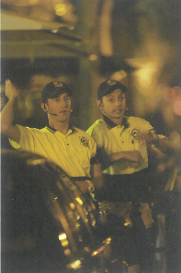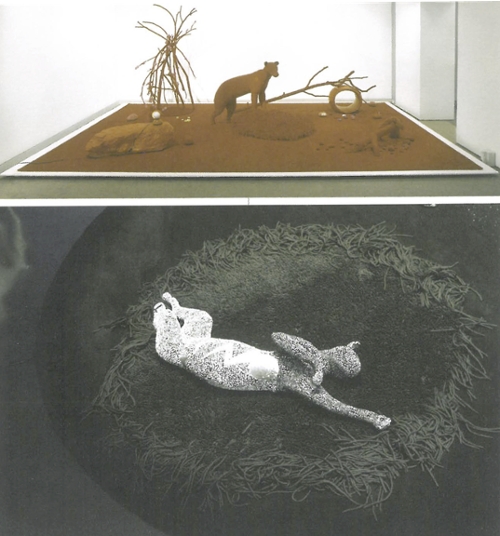
Friday night in Northbridge, Perth's inner city café and nightclub district, is neither glamorous or salubrious; in fact it's a little down at heel and just a bit seedy. Cheap and cheerful Asian restaurants, pizza parlours and travel agencies happily co-exist alongside 'Adult' shops, karaoke bars, pubs and clubs. With its mix of often disenfranchised yoof, junkies, drunks, a hefty police presence and punters hoping for a good night out – it can be socially and racially volatile, but more often than not, it's just a bit rough around the edges.
Nevertheless, it's a brave bunch of performers who take their work into such an unpredictable environment. Such cheeky effrontery is an apparently effortless part of Perth-based pvi collective's tactical arsenal whose persistent questioning of issues surrounding sedition, surveillance, matters of public safety, the law and its impact on our shared social space and behaviours has distinguished their performative projects over a number of years. Any venture into the dark underbelly of the beast requires a guide, and ours, cheerfully but briskly takes charge, handing out oversized headsets connected to portable FM radios. Our first port of call is a snooker hall where, in a grungy back room, we watch a motivational video outlining our roles and responsibilities. Here too, we are kitted up with props of exquisite blandness (suburban newspapers, plastic wine glasses etc), to assist us to blend into the environment. From this point on, instructions are fed to us via our headsets, overlaid with an excellent soundscape by Jason Sweeney. This sonic cocoon is unexpectedly comforting despite the strange distortion of proximity and distance. Properly equipped, we obediently make our way back onto the street, trying to look inconspicuous.
At a nearby intersection we encounter members of the 'loyal citizens underground' or l.c.u. engaged in a strange form of good-behaviour inducing calisthenics. On a mission, they are literally doing what the powers-that-be have suggested that we should all be doing: taking responsibility for law and order and good manners, into our own hands, a sort of civic police force. Like most cults, the l.c.u.'s evangelical zeal manifests itself through cryptic gestures, mysterious rituals and an arbitrary set of rules and regulations. They are armed not only with 'code of conduct' cards, but an overzealous enthusiasm for current legislation and social standards. Audience members are there to watch, listen and learn by example.
Over the next sixty minutes, audience members observe the lessons of the street. We are taught to look left and right and left again before crossing the road, and if at all possible to hold hands. We are exhorted on the evils of jaywalking and littering. We witness various altercations between committed l.c.u. members (Ben Sutton, Chris Williams, Jackson Castiglione and Ofa Fotu) remonstrating with what appear to be members of the public engaged in various anti-social behaviours - soliciting, disorderly conduct, aggressive begging and loitering. It's a little disappointing to realise that these are plants. Initially convincing, reform loses some of its intensity because there is no real interaction with people on the street. We pass through and around them. They are simply part of the mise en scène. Of course, the potential risk for the performers is real, but my perhaps unfair expectation is that if you take a work with these concerns onto the street, then you are responsible for moving beyond a theatre of illustration into a more rigorously extended engagement that encompasses performers, audience and the public alike.
I'm a big fan of pvi collective. They're witty and smart and their particular brand of performative silliness is extremely engaging. I enjoyed reform but in the end I was left feeling a bit bemused. It may sound churlish but whilst pvi actively disavows the 'grand gesture' and 'dramatic disturbance', in favour of more subtle interventions, they perhaps under-estimated their own capacity to create a more challenging experience. Whilst there's a lot to be said for putting some humour, playfulness and good manners back onto the street, reform was perhaps rather more charming than subversive, more comedy of manners than political satire.












